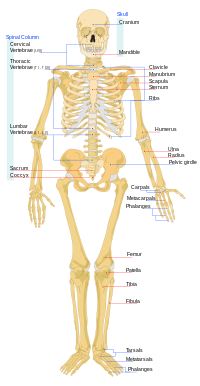Wikipedia:Featured picture candidates/Human skeleton back.svg


- Reason
- Ultra-enc high quality diagrams, unanimous support on COM:FPC for both. I suggest we give both the bronze star. Previous nomination here, but I closed it as not promoted without prejudice due to 14 images being nominated at once.
- Proposed caption
- Front/back view of a female human skeleton.
- Articles this image appears in
- Skeleton, Human skeleton, human anatomy
- Creator
- LadyofHats
- Support as nominator MER-C 08:52, 26 September 2007 (UTC)
- Support high quality diagrams, very encyclopaedic --Luc Viatour 09:01, 26 September 2007 (UTC)
- Support This is a no-brainer. You read "LadyofHats", you support. Standards are high. BTW, someone needs to clean up those articles. We have a lot of skeleton pictures all over the place, but not a lot of organisation, check out human anatomy, for instance. Separa 11:49, 26 September 2007 (UTC)
- Strong support - Ultra-enc indeed. --Sean 15:17, 26 September 2007 (UTC)
- Support - LadyOfHats always does very nice, professional and enc diagrams, and this is no exeption.. Yzmo talk 16:26, 26 September 2007 (UTC)
- Support - very good image --Childzy ¤ Talk 12:31, 28 September 2007 (UTC)
- comments This image is being nominated on commons as well and one user pointed this out and I though it important that everybody here know.
Have any reviewers trained in the human anatomy double-checked the terms used in the figure? I am asking because I showed this figure to a medical doctor I know and trust to get an opinion, and the reaction was confusion and comments about inconsistent or truncated notation. Some terms are in roman, like Radius whereas others are in English, like Ribs. Another comment I got is that, e.g., Coccyx is a truncated name (I did not get what the full name is). Apparently such mixed terms and truncated names are not normally what is presented in textbooks or encyclopedias. I just checked my own Danish encyclopedia for figures of the skeleton and all the terms were (consistently) in Danish. I guess there must be English terms for all constituent bones as well? Therefore, would it not be more consistent to present either only English terms or only Latin terms? Perhaps one version for each language? -- Slaunger 21:08, 26 September 2007 (UTC)
- Well I'm not proclaiming to be an expert, but I've got a bit of knowledge. I'd already had a quick look at it, and wasn't aghast at anything, and still aren't. For example the radius is only ever called the radius in English, unless you want to call it the "thick bone in the forearm" or something. Coccyx again is the general term used in English (the latin is os coccygis). It gels pretty much with a skeleton diagram in one of my old first year Uni Biology textbooks, just with more detail on this one. I'm happy to leave it to others to research further, but it generally looks OK to me. For those that are interested, here's the links to the discussions on Commons: front and back. --jjron 17:54, 28 September 2007 (UTC)
- Comment I've taken courses in both anatomy and osteology and I don't think anyone outside of the driest textbook would refer to the coccyx as os coccygis. The rest of the terms are all what I'd expect them to be if I were glancing through my old textbooks. I'm holding off voting for the moment, but I'm a little unimpressed by some of the labels lacking (no cranial or pelvic bones specified; carpal bones not identified, etc.)Matt Deres 10:52, 1 October 2007 (UTC)
- Question. Incidentally though, does anyone know why it's specifically labelled as a female skeleton? Has she done say the shape of the pelvis as a female, or what? --jjron 17:58, 28 September 2007 (UTC)
- Pelvis, mainly, a few other minor features. It makes enough of a difference as to need labelled. Vanished user talk 21:59, 1 October 2007 (UTC)
- Support I just grabbed some anatomy books and checked over these images very quickly. Sure, this isn't an exact level of detail or choice of terminology I can find anywhere else, but that shouldn't matter. I can find lots of tiny part-of-skeleton diagrams that label everything with the longest name possible and lots of simple diagrams that leave tons of stuff out. This appears to be a good compromise. I honestly don't understand the criticism about English vs. Latin; it all looks like English to me, as jjron mentions above. Enuja (talk) 07:04, 29 September 2007 (UTC)
- Support
Though an additional image to show the bones of the head or pelvis might be an appropriate expansion, per above, I don't think it's strictly necessary. Vanished user talk 21:59, 1 October 2007 (UTC)- Ah, we do have additional, more detailed images for everything except the pelvis. Let's nominate those next =) Vanished user talk 22:00, 1 October 2007 (UTC)
- Weak support per above, the only problem I have with the image is that some of the labels appear to brush up against their respective pointer lines, and that the distances between the label and pointer line are not consistent, for example compare 'sternum' with 'femur.' Otherwise good work! Jeff Dahl 18:44, 2 October 2007 (UTC)
Note to the closer (not me): there are two images to be featured as a result of this nom, not one. MER-C 11:25, 3 October 2007 (UTC)
Promoted Image:Human skeleton front.svg -- Chris B • talk 14:00, 4 October 2007 (UTC)
Promoted Image:Human skeleton back.svg -- Chris B • talk 14:00, 4 October 2007 (UTC)
